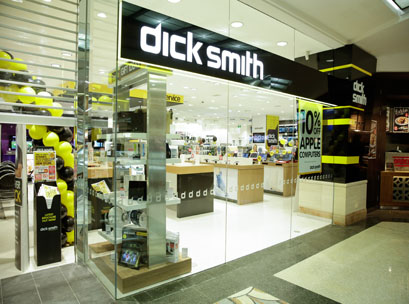 The board of Dick Smith has placed the troubled electrical retailer into voluntary administration.
The board of Dick Smith has placed the troubled electrical retailer into voluntary administration.
Trade on Dick Smith shares was halted yesterday morning, pending an announcement about its funding position and debt financing covenants.
Dick Smith’s share price plunged at the end of 2015 after it scrapped its profit guidance following disappointing sales in October and November.
The retailer embarked on a clearance sale over the Christmas period to improve its position, however the company announced today that sales and cash generation in December were below management expectations, continuing a trend experienced during the second quarter of FY16.
“The company explored alternate funding, however the directors formed the view that any success in obtaining alternative funding would not have been sufficiently timely to support short-term funding requirements and allow the company to order required inventory during the next four to six weeks,” Dick Smith chairman, Rob Murray, said in a statement to the market today.
Murray said he was confident of the long-term viability of the company, however the directors had been unsuccessful in obtaining the support from its banking syndicate to see it through this period.
McGrathNicol has been appointed to act as voluntary administrator and will work with directors and senior management to “explore all options to allow the company to continue as a going concern.”
“The board believes the appointment of a voluntary administrator at this time is the best way to protect the interest of shareholders, creditors, employees, suppliers and other stakeholders,” Murray said.
Dick Smith’s shares have now been suspended from trading.
Dick Smith operates 393 stores across Australia and New Zealand under four brands, Dick Smith, Electronics powered by Dick Smith, Move and Move by Dick Smith.
There are 3300 employees and annual sales of approximately $1.3 billion. Dick Smith began in 1968 as a car radio installation business in Sydney. In 2012, Woolworths sold the business to Anchorage Capital Partners who then took DSH public in 2013.
Update: Receivers called in (5/1, 10:50am, EAST)
Following the appointment of the voluntary administrators, Dick Smith was placed into receivership. Ferrier Hodgson partners James Stewart, Jim Sarantinos and Ryan Eagle were appointed receivers and managers over DSH and a number of associated entities by a syndicate of lenders which hold security over the group.
Stewart said it was too early to clearly identify the primary causes of the company’s current financial position and the reasons for its decline other than saying the business had become cash constrained in recent times. He said it would be business as usual while the receivers look at the restructuring and realisation opportunities for the group.
“Dick Smith is one of the best known brands associated with consumer electronics in Australia and New Zealand,” Stewart said. “We are immediately calling for expressions of interest for a sale of the business as a going concern.”
Stewart said that the New Zealand business was profitable and expected it would be attractive to potential buyers.
He added that employees will continue to be paid by the receivers and that it is expected that Australian employee entitlements will be covered under the Fair Entitlements Guarantee (FEG) scheme if the business cannot be sold as a going concern.
Update: Rivals react (5/1, 10:30AM, EAST)
Commenting on Dick Smith’s placement into administration, Kogan founder and CEO, Ruslan Kogan, described the situation as “bittersweet”.
“Dick Smith has been an iconic Australian brand for decades and it’s sad to see their demise,” said Kogan. “It’s a sign of the changing retail landscape that has more and more Aussies turning online for the latest products at the best prices. It’s a bittersweet situation.
“On one hand, we love competition — it gets us out of bed in the morning. On the other hand, Kogan.com is proud to have played a significant part in creating more efficiency in the industry and driving down prices for shoppers, which has had a noticeable effect on many large retailers, past and present.
“While it’s common for retailers to raise prices when there is decreased competition, there won’t be anything like that at Kogan.com – our mission is to make the latest products more affordable for all Australians and we’ll keep using technology to innovate new ways to drive prices down.”
Want more Inside Retail? Subscribe to Inside Retail Weekly now and get our premium print publication delivered to your door every week.





